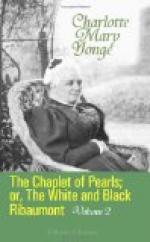’Madame is right. She had brought away some money and jewels with her, but alas, Madame, during my illness, without my knowledge, the dear child absolutely sold them to procure comforts for me. Nay’— his eyes filled with tears—’she whom they blame for vanities sold the very hair from her head to purchase unguents to ease the old man’s pains; nor did I know it for many a day after. From day to day we can live, for our own people willingly support a pastor and his family; and in every house my daughter has been loved,— everywhere but in this harsh-judging town. But for the expense of a voyage, even were we at Bordeaux or La Rochelle, we have nothing, save by parting with the only jewels that remain to her, and those--those, she says, are heirlooms; and, poor child, she guards them almost as jealously as her infant, around whom she has fastened them beneath her clothes. She will not even as yet hear of leaving them in pledge, to be redeemed by the family. She says they would hardly know her without them. And truly, Madame, I scarce venture to take her to England, ere I know what reception would await her. Should her husband’s family disown or cast her off, I could take better care of her here than in a strange land.’
‘You are right, Maitre Gardon,’ said the Duchess; ’the risk might be great. I would see this lady. She must be a rare creature. Bear her my greetings, my friend, and pray her to do me the honour of a visit this afternoon. Tell her I would come myself to her, but that I understand she does not wish to attract notice.’
‘Madame,’ said Isaac, rising, and with a strange manner, between a smile and a tear of earnestness, ’allow me to bespeak your goodness for my daughter. The poor little thing is scarcely more than a child. She is but eighteen even now, and it is not always easy to tell whether she will be an angel of noble goodness, or, pardon me, a half-petulant child.’
‘I understand:’ Madame de Quinet laughed, and she probably did understand more than reluctant, anxious Isaac Gardon thought she did, of his winning, gracious, yet haughty, head-strong little charge, so humbly helpful one moment, so self-asserting and childish the next, so dear to him, yet so unlike anything in his experience.
‘Child,’ he said, as he found her in the sunny window engaged in plaiting the deep folds of his starched ruffs, ’you have something to forgive me.’
‘Fathers do not ask their children’s pardon,’ said Eustacie, brightly, but then, with sudden dismay, ’Ah! you have not said I should go to the Moustier again.’
’No, daughter; but Madame de Quinet entreats—these are her words— that you will do her the honour of calling on her. She would come to you, but that she fears to attract notice to us.’
‘You have told her!’ exclaimed Eustacie.
’I was compelled, but I had already thought of asking your consent, and she is a true and generous lady, with whom your secret will be safe, and who can hush the idle tongues here. So, daughter,’ he added restlessly, ’don your hood; that ruff will serve for another day.’




